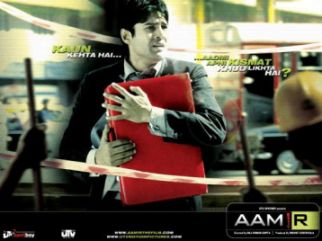
 |
 Go beyond the prescribed boundaries of music! Experience the new face of Bollywood composers. Amit Trivedi is imaginative, creative and sophisticated. Keen on extracting the crisp music from each instrument used, this highly ‘ahead of its time’ six pieces soundtrack is an experimental project – with untapped futuristic sounds, unheard musical formats and dense fusions. Go beyond the prescribed boundaries of music! Experience the new face of Bollywood composers. Amit Trivedi is imaginative, creative and sophisticated. Keen on extracting the crisp music from each instrument used, this highly ‘ahead of its time’ six pieces soundtrack is an experimental project – with untapped futuristic sounds, unheard musical formats and dense fusions.
Scrap the formats and face the revolution in the composing style with Phas Gaya (Never Mind). A carefree attitude, really emphasizing on the words ‘never-mind’, expels an infinite amount of freshness in terms of orchestration, instrumentation, arrangement, voice selection and originality. The list continues with Neuman Pinto in a self-expressive mode – an amazing youthfulness in his voice. From the opening piano to the thrilling guitar playing in the background and also incorporating the plethora of conceptualized sounds, Phas Gaya (Never Mind) is seriously addictive. The best part remains the progressive ascension from 2m25s. A stunner! Confusing, mysterious and yet rocking is Haara by Amit Trivedi. Encompassing on gypsy style violins, a melancholic feel and atmosphere pertain throughout, with the high use of single punches on the synthesizers. The ambient style created is quickly diverted to a more brusque development with fluctuating vocals, trying to convey more complex messages and accompanied music follows suit. Haara remains sometimes incomprehensible with shades of rock and ambient genres and glimpses of Hell Raiser’s Emergency Room background music. Synthesizers have never been played so accurately in a Climax Theme recently and the six minute piece is vocally driven a la Enya, with Marianne D'Cruz Aiman heart-felt rendition. The shift in the strings music from 1m01s shows the ability in the composer; observant in high standards. Jeetendra Thakur’s solo violin work is an apt add-on and is somehow overshadowed by the opening bars of the Jaws Theme from legendary John Williams. A captivating climax with deep vocals, surely not to be missed. The outro from 4m13s in Ek Lau can be hailed as magnificent as it manifests the peacefulness of the track. If Anwar’s Javeda Zindagi (Tosey Naina Lagey) was one of Shilpa Rao’s unequivocal highlights, then Ek Lau indulges into the same tranquil zones of meditative alaaps. Amitabh’s small background contribution is enriching to the gradually likable piece where music takes a backseat and the voices are the main instruments.
Chakar Ghumyo follows the folksy style of music, with Amit Trivedi exposing his vocal talents in a somewhat situational number. Arrangements are very traditional, like in the ‘melas’ and the track has glimpses of tribes' music. Pursing a similar pattern in the tempo limits the appeal of the track, and the enthusiastic singing takes all the accolades, inspite of an optimistic orchestration-style. A mélange of genres, and with the approach from established names such as Enya, John Williams, Jean Michel Jarre, Kraftwerk –which themselves are experts in their own specific genres, Amit Trivedi reconstructs the formats and genres adopted in Bollywood. His vivacity in extracting sounds from the synthesizers and keyboards is exemplary. Experimentation has received a new dimension. Amitabh Varma’s simple, descriptive and valid lyrics should take him ahead in no time. Good composers still exist! Comparison, at this stage, is useless, as Amit Trivedi still has a long way to prove himself, but his insight into the dynamics of composing and producing music elevates him as a strong player in bringing innovation in this industry. Highly recommended for musical experimentalists and for those searching for innovation! (The rest of the soundtrack includes bonus songs such as Allah Hoo and Bandya (Khuda Kay Liye), Chaap Tilak (Jhoomo Re) and Dilruba (Kailasa))
|
| Comments | Contact Us | Advertise | Terms of Service | Privacy Policy |